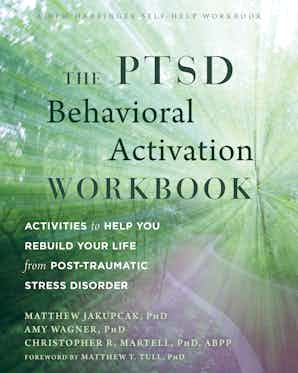By Matthew Jakupcak, PhD, coauthor of The PTSD Behavioral Activation Workbook
“Take two of these strategies and call me in a month.”
I remember my high school chemistry teacher’s seemingly giddy lecture on the wonders of aspirin. She marveled at this powerful medicine; so simple, prevalent, and yet able to do so much for the human body. Aspirin can ease pain and swelling after an acute injury, reduce fevers and swelling, prevent critical cardiac events, and reduce the severity of damage should a crisis such as a heart attack occur. Now that I am a clinical psychologist trained in a number of different psychotherapy approaches, I marvel at the effectiveness, simplicity, and versatility of another powerful tool for health: a therapy called behavioral activation.
Like aspirin, behavioral activation is relatively simple compared to other treatments; it is what it sounds like—learning to activate behaviors that can help you reduce suffering, prevent future crises, and help buffer against traumatic events. It’s also a prevalent approach used widely by psychologists, social workers, nurses, and medical doctors. What’s more, it’s something that any of us can learn to use on our own to improve our life, recover from life stressors, and prevent or at least minimize future experiences of depression, post-traumatic symptoms, or pain-related disabilities.
Although there are several components to behavioral activation, two overarching and straightforward strategies can help you begin to reshape your life in as little as one month’s time.
- The first of the strategies involves an assessment of your personal values. Sit down and write for ten minutes each week about your values: What matters to you? Your health? Your spirituality? Family? Community? Why do these things matter? How are they represented (if they are) in your current life? Review the past several weeks. Can you identify recent behaviors that represent these values? If you value health, can you point to recent actions (e.g., exercise, healthy eating, prioritizing sleep) you’ve taken that reflect you taking actions in accordance with these values? If spirituality is a core value, how do you act on it? Do you attend church services or practice meditation? Do you read sacred verses, books, or poetry that help you invoke your spiritual self? During each ten-minute writing exercise, record as much of your thoughts as you can, but don’t “overthink” it. These should be your values, not what you think you should value. This exercise can help inspire change, and will lead you to begin the second strategy: setting goals to make your actions reflect your values.
- Goal setting, guided by personal values, will orient you to make changes to improve your mental health. Start by picking three of your top values underrepresented by your recent activities, and think of behaviors that would best embody each of these personal values. Now think of goals you can set in the month ahead to start to manifest these values in some ongoing way. Don’t start too big. In fact, if you have a bigger goal in mind, break it down into smaller parts. For example, if your goal is to start to become more engaged with your extended family, don’t plan a family reunion as your first enactment of this value. Instead, consider setting a more modest goal of reaching out to a different family member each week by phone. It’s best to make each “subgoal” something you can easily accomplish in less than an hour, and it’s best to schedule the subgoals during days and times that maximize the likelihood you’ll achieve them.
These aren’t all the components of behavioral activation. Identifying the traps of avoidance patterns and why they occur, problem-solving barriers to accomplishing your goals, and learning to be mindful of your experience of the present moment can help you advance toward the future you want and maintain your progress along the way. However, if you practice these first two behavioral activation strategies consistently for one month, you’ll most likely begin to notice improvements in your mood and outlook in life. They are not complicated steps, but they can be highly effective in creating new habits and transforming your life. Consider them to be powerful medicine and foundations for your mental health.
Matthew Jakupcak, PhD, is a clinical psychologist and researcher who has studied and treated psychological trauma, post-traumatic stress disorder (PTSD), and high-risk behaviors in military veterans, first responders (i.e., firefighters, paramedics, police officers), and young adults. Jakupcak is an associate professor at the University of Washington School of Medicine, has published more than fifty peer-reviewed scientific articles and book chapters, and has presented at over sixty national and regional conferences and workshops on the topics of PTSD, depression, suicidal behaviors, interpersonal violence, and behavioral activation treatment interventions in trauma-exposed populations. He lives in Missoula, MT.



 Why Journaling Is Especially Helpful to Adult Children of Emotionally Immature Parents
Why Journaling Is Especially Helpful to Adult Children of Emotionally Immature Parents